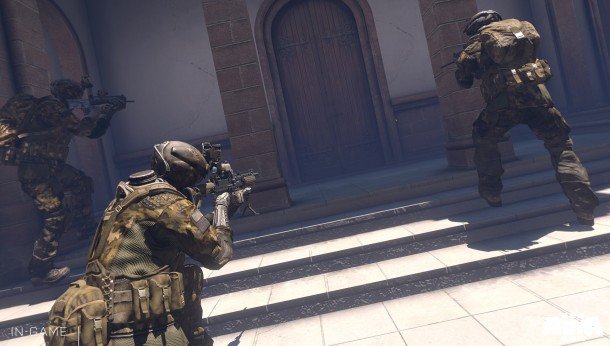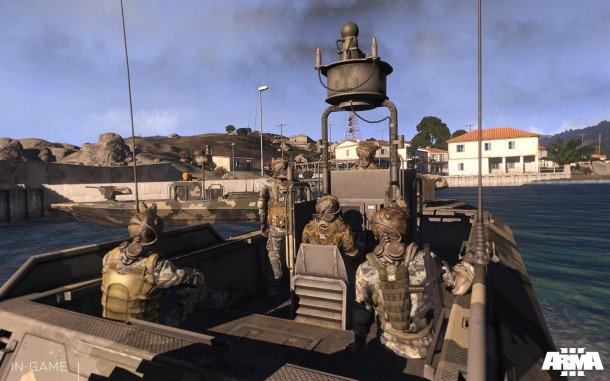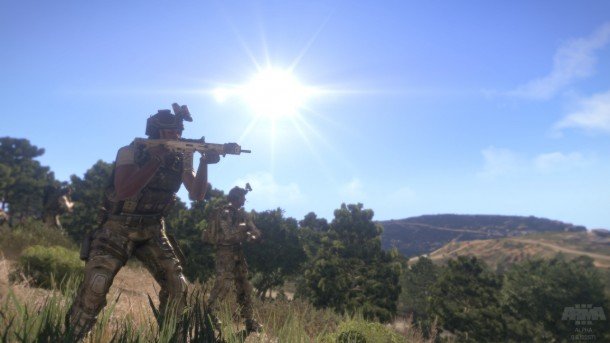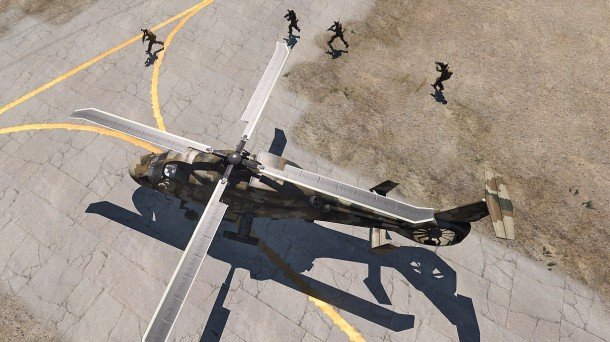Arma 3 interview: Bohemia explains the Arma 3 campaign

Late last week we learned that Arma 3 won't initially release with any campaign content (something that should make it an interesting challenge to review, for one thing). Instead, Arma 3 will launch with 12 single-player showcases, nine multiplayer scenarios, eight firing drills, and its mission editor, while campaign episodes will parachute in shortly after release. This should allow the military sim to emerge from beta sooner at the cost of staggering its content.
I got in touch with Joris-Jan van't Land (Project Lead) and Jay Crowe (Creative Director) to learn more about about this decision as well as what we should expect from the content of the campaign.
PC Gamer: Help me make sure I've got this right: Arma 3 will launch with zero campaign episodes, but you'll begin releasing them one per month for the three months following release. Is that accurate?
Jay Crowe: Spot on, sir. Well, perhaps with the additional note that, of course, they're free.
Joris van't Land: We see the launch of the game as a solid starting point. We've focused on creating single-player showcases and challenges, multiplayer modes and, of course, the highly anticipated, Altis terrain, together with the editor and its range of units, vehicles, modules, etc.
Crowe: Exactly, we hope that Arma 3's release content provides a big variety of gameplay out of the box. We want to show players what the game is all about—what opportunities it offers—built on a solid platform, which we can gradually extend with free additions like the campaign episodes.
van't Land: But, honestly, we will admit that this is not our originally planned release strategy. It is one borne from the problems the project faced over the past years, the insightful experiences of releasing public Alpha and Beta versions, and wanting to deliver a quality campaign.
The biggest gaming news, reviews and hardware deals
Keep up to date with the most important stories and the best deals, as picked by the PC Gamer team.
Can you give us an overview of the campaign's story and the player's role?
Crowe: The player is a regular soldier, a Corporal who's part of a NATO peacekeeping mission in the Mediterranean. Originally deployed in the wake of the total economic collapse of the Republic of Altis—a nation something like the size of Malta—a situation that flared up into a bloody civil war. It's been a couple of years of uneasy peace following a cease-fire. This US-led force is now in the process of a staged drawdown, tasked to decommission the bases and coordinate the scrapping of military equipment and vehicles that they can't afford to ship back home.

This withdrawal takes place in the context of decades of recession in the west and a rise in power and ambition of nations under the banner of CSAT, the Canton-Protocol Strategic Alliance Treaty. Stratis—the island where the player's unit is based—is a key strategic position between east and west. But, with the US more concerned about its interests and influence in the Pacific and traditional European powers looking inwards at their flatlining economies and mass unemployment, it's become something of an unaffordable operation.
The vacuum left by withdrawing NATO forces is being rapidly filled by CSAT, creating the conditions for, one might say, a flashpoint. The campaign follows the player from this point and examines his role across three distinct episodes: Survive, Adapt, Win.
How are the campaign episodes connected?
Crowe: Together, they form three parts of a single overarching story. Our “Episodes” are actually something like sets of interconnected missions—each a mini-campaign—related to the others in terms of the progression of a single timeline and in the gradual introduction of responsibility to the player.
"We ask the designers to think about what 'winning' actually means."
van't Land: The episodic design is not new. It's not something that we implemented after deciding on these release plans. Though, admittedly, we originally intended to release them together.
Crowe: When we came to redesign the campaign, the game—the sandbox platform—was in a considerable state of flux. The episodic nature of our revised approach was partly geared towards managing that, and partly on trying to investigate some distinct themes.
van't Land: Arma 3 is now built on a singular vision—combined arms military with an infantry core—but it's still a very broad topic, so the themes help to focus that a bit more.
Crowe: While each episode looks at a different theme, there's a consistent thread between them all—yes, in terms of narrative—but, perhaps more importantly, in terms of gameplay. If you look at the Showcases, for example, they generally give the player an objective, a tool or a set of tools, and offer some freedom in terms of how to go about achieving that goal. In the process, one aspect of the game is "showcased." They work because they're simple enough for us to test, but open enough to allow players to enjoy completing them without being led by the hand. Our campaign episodes are similar, but—rather than focusing on a single “thing,” like “tanks” or “scuba”—they develop a single theme over the course of a few missions, deploying a range of meaningful and appropriate features that, hopefully, serve to create a consistent, enjoyable experience.

Will the result of certain events affect how the campaign plays out or ends in Arma 3? What are some examples?
van't Land: Branching and player agency over the plot is not what we're after with the Arma 3 campaign. We went back to a simpler approach that is focused on fun, and one we can test properly.
Crowe: The gameplay itself provides some opportunities for players to approach their objectives with a degree of autonomy. An example would be one mission where you have the choice to go to a weapons cache. It's an optional objective but, if you do go there, you'll be able to scavenge weapons to use in the following mission that best fits your style of play. However, if you mess up, that mission becomes more difficult.
van't Land: So there is some persistency between scenarios and episodes, but it's fairly limited and not the focal point of the experience. Big “cinematic” choices aren't really something we want to confront the player with too much—at least to begin with.
Crowe: The decisions the player does have are fairly organic. Pick the right way to complete the objective. Do so with as few casualties as possible. Unlike in Arma 2's “ Harvest Red ” campaign, where one had to—somehow or another—babysit your comrades, in the A3 campaign everyone can die on a mission. Sometimes, it'll be your fault for being a crappy leader; other times, it's because that helicopter you shot down crash-landed in the middle of your unit. C'est l'Arma.
"Sometimes, it'll be your fault for being a crappy leader; other times, it's because that helicopter you shot down crash-landed in the middle of your unit. C'est l'Arma."
What feedback did players give you about the Arma 2 campaigns?
van't Land: As with a lot of feedback regarding the Arma games, it was quite ... mixed. Some people really enjoyed playing them. Some were frustrated with the initial release versions not working and having showstopper bugs. Others waited for patches and re-played them in a much better state. Myself, I remember several of the missions fondly and it being very different to other games I was playing—in a good way. My favorite campaign would still be the Resistance expansion.
Crowe: I think “mixed” is a fair description. There were a lot of great things in the campaign, which—one way or another—players couldn't always access. The very nature of the design made it a bit of a nightmare for QA to test, and—unsurprisingly—that meant, where'd you'd have one person having a solid play-through, you'd have another—like me—aborting two or three hours of progress—or, indeed, restarting the entire campaign—because it needed to be patched up. There's also something to be said about the general framing of the campaign. In A2 you were playing as a fairly elite recon leader. I think some people missed the feeling of being more down to earth, something like “a nobody”—just one cog in the war machine—that eventually comes to play a bigger and bigger role.
van't Land: We went for too much complexity and cinematic approaches that we could not execute well enough. Ambition has always been something that drives our games—it's important to creatively challenge yourself, but it also can mean we take on too much. Something that was also true of the original concept for the Arma 3 campaign. Plus, the use of higher-than-squad command in the Arma 2 campaign has always been a bone of contention. The Warfare mode, base building and such elements in single-player—a lot can be said about that ...

Crowe: Indeed, but, I'm afraid much of it is negative! When we set that kind of experience against our goal of trying to convince players to give Arma a chance and discover the beauty of the game, well, I think it's asking too much from one campaign. Joris is spot on about the need to be ambitious and challenging, what we've tried to do is find a good balance between stability and innovation. When we look at the awesome experiences you can have—that people have been having—during the Alpha and Beta, it only hardens our resolve to deliver something more worthy of A3's potential.
What sort of tactical situations do you want to put players in? What experiences do you want them to have in the campaign?
van't Land: Very many different ones—that's sort of the point of the three stages. My personal favorite situation is being a grunt in an infantry squad, taking part in a combined arms assault. Another great experience is roaming the massive terrain and finding opportunities as an underdog—locating weapon caches, setting up ambushes, avoiding conflict when that's more appropriate. But there is a lot of subjectivity at play there—others enjoy being in command or being a lone operator. Or driving a tank, flying a helicopter, etc. We returned in some way to our approach with Cold War Crisis and Resistance , where many types of gameplay are offered, but none are dominating. So if you dislike a certain type of gameplay you're not stuck with it through most of the campaign.
Crowe: Let's take the most awkwardly named episode. I mean—"Survive," "Adapt"—those themes immediately conjure up some sense of the experience, but "Win," well, perhaps appears more two-dimensional. Smells a bit like tiger blood or something. So, here, we ask the designers to think about what "winning" actually means. There are the obvious things like, being part of a dominant force or striking serious blows against your enemy, but one might also consider things like the price of victory, winning at what cost, winning against the odds, despite friendly fire, etc. We want our game mechanics and features to be meaningful and, to do that, we want to put players in specific situations and challenge them to think about how to complete their objectives.
Bohemia has more campaign information on the Arma 3 blog . Arma 3 is currently available for purchase through Steam Early Access.

Evan's a hardcore FPS enthusiast who joined PC Gamer in 2008. After an era spent publishing reviews, news, and cover features, he now oversees editorial operations for PC Gamer worldwide, including setting policy, training, and editing stories written by the wider team. His most-played FPSes are CS:GO, Team Fortress 2, Team Fortress Classic, Rainbow Six Siege, and Arma 2. His first multiplayer FPS was Quake 2, played on serial LAN in his uncle's basement, the ideal conditions for instilling a lifelong fondness for fragging. Evan also leads production of the PC Gaming Show, the annual E3 showcase event dedicated to PC gaming.

